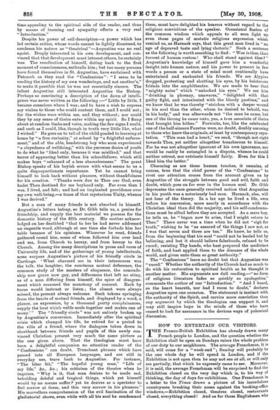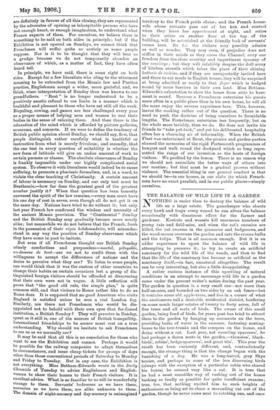HOW TO ENTERTAIN OUR VISITORS.
THE Franco-British Exhibition has already drawn many French people to London, and the question whether the Exhibition shall be open on Sundays raises the whole problem of our duty to our neighbours. The average Frenchman, it is said, will come for a " week-end "; Sunday will probably be the one whole day he will spend in London, and if the Exhibition is not open then he may not see at all, or will only see partially, that which he expressly came to see. Moreover, it is said, the average Frenchman will be surprised to find the Exhibition closed on the very day which is, to his way of thinking, the day of days for exhibitions. One Frenchman in a letter to the Times draws a picture of his incredulous countrymen breaking their noses against the booking-office windows,—Exhibition closed, theatres closed, restaurants closed, everything closed! And as for those Englishmen who
are definitely in favour of all this closing, they are represented by the advocates of opening as inhospitable persons who have not enough heart, or enough imagination, to understand what France expects of them. For ourselves, we believe there is something to be said on both sides in principle; but if the Exhibition is not opened on Sundays, we cannot think that Frenchmen will suffer quite so acutely as some people suppose. Nor is it to be thought that they will bear us a grudge because we do not temporarily abandon an observance of which, as a matter of fact, they have often beard tell.
In principle, we have said, there is some right on both sides. Except for a few literalists who cling to the uttermost meaning to be extracted from the Mosaic law and Puritan practice, Englishmen accept a wider, more grateful, and, we think, wiser interpretation of Sunday than was known to our grandfathers. " Rest " is no longer understood to be a positively ascetic refusal to use limbs in a manner which is healthful and pleasant to those who have sat still all the week. Bicycling, rowing, and games are less challenged every year as a proper means of helping men and women to rest their bodies in the sense of relaxing them. And then there is the relaxation of the mind which is afforded by picture galleries, museums, and concerts. If we were to define the tendency of British public opinion about Sunday, we should say, first, that people distinguish rather carefully what is healthful or instructive from what is merely frivolous; and secondly, that the one test in every question of suitability is whether the new form of latitude will give an undue amount of work to certain persons or classes. The absolute observance of Sunday is frankly impossible under our highly complicated social system. To observe it with literalness would indeed be to cause suffering, to promote a pharisaic formalism, and, in a word, to violate the clear teaching of Christianity. A certain amount of labour is necessary on Sunday, and our only test must be Benthamic,—how far does the greatest good of the greatest number justify it ? When that question has been honestly answered the spirit of the law remains,—every man must have his one day of rest in seven, even though all do not get it on the same day. Nations have tried to do without it; but only last year French law confirmed the wisdom and necessity of the ancient Mosaic provision. The " Continental " Sunday and the British Sunday may gradually become more nearly alike; but meanwhile we do not believe that the French, fresh in the possession of their rgpos hebdonzadaire, will misunder- stand in any way the practice of Sunday observance which they have come in part to imitate.
But even if all Frenchmen thought our British Sunday utterly comfortless and purposeless—mortel, pitoyable, au-dessous de tout—are we not to credit them with the willingness to accept the differences of nations and the desire to perceive what they are? To listen to some people, one would think that it was the custom of other countries to change their habits on certain occasions lest a group of dis- tinguished foreign visitors should be offended at discovering that their own were not in vogue. A little reflection will prove that "the good old rule, the simple plan," is quite common still, and that visitors to Rome rather like to do as Rome does. It is supposed that no good American who visits England is satisfied unless he sees a real London fog. Similarly, are there not Frenchmen who would be dis- appointed not to behold with their own eyes that far-famed institution, a British Sunday ? They will perceive in Sunday, spent as it still is, one of the sources of British tranquillity. International friendships to be secure must rest on a true understanding. Why should we hesitate to ask Frenchmen to see us as we normally are P It may be said that all this is no consolation for those who want to see the Exhibition and cannot. Perhaps it would be possible for the railway companies to adapt themselves to circumstances, and issue cheap tickets for groups of days other than those conventional periods of Saturday to Monday and Friday to Tuesday. But in any case, the Exhibition is not everything. Miss Betham-Edwards wrote in the Daily Chronicle of Tuesday to advise Englishmen and English- women to show their, homes to their French visitors. It is excellent advice. What is so familiar to us will be wonderfully strange to them. Servants' bedrooms as we have them, nurseries as we have them, are alike unknown to them. The domain of night-nursery and day-nursery is unimagined territory to the French petits chouse; and the French house- wife whose servants pass out of her ken and control when they leave her appartement at night, and retire to their attics on another floor at the top of the building, will be astonished at the friendly look of servants' rooms here. So far the visitors may possibly admire as well as wonder. They may even, if prejudice does not stiffen in their minds as they cross the Channel, envy our freedom from the close scrutiny and impertinent tyranny of the concierge ; but they will infallibly despise the dull array of kitchen utensils which takes the place of their shining batterie de cuisine, and if they are unexpectedly invited here and there to eat meals in English homes, they will be surprised at being admitted so easily to that foyer which is hedged round by more barriers in their own land. Miss Bethatn- Edwards's exhortation to show the house from attic to base- ment is sound. Because a Frenchman entertains his guests more often in a public place than in his own house, be will all the more enjoy the reverse experience here. This, however, leaves the cooking rather out of the question. There is no need to push the doctrine of being ourselves to formidable lengths. The Frenchman entertains less frequently, but on the whole more lavishly, than we do. He does not invite his friends to "take pot-luck," and yet his deliberated hospitality often has a charming air of informality. When the British Fleet was entertained at Brest, the picnics and garden-parties shamed the memories of the rigid Portsmouth programmes of banquet and walk round the dockyard which so long repre- sented the range of our invention as the hosts of foreign visitors. We profited by the lesson. There is no reason why we should not assimilate the better ways of others into our routine ; but that must be a gradual process without violence. The essential thing in our general conduct is that we should be—in our homes, in our clubs (to which French- men have no exact parallel), and in our public places—simply ourselves.







































 Previous page
Previous page